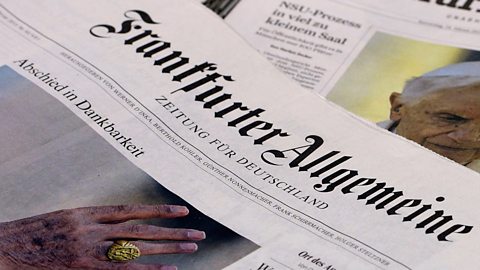What is a noun?
A noun is a naming word for the following:
- person
- creature
- place
- thing
It's easy to identify a German noun because it always has a capital letter no matter where it is in the sentence.
It might seem unusual to us, but it was once common practice to capitalise nouns in English, as can be seen in the original document of the US constitution and the original version of Gulliver's Travels by Jonathan Swift.
Look at the German nouns, that always start with a capital letter, in the following sentences:
Mein Bruder heißt Markus und er hat einen Hund. Der Hund wohnt in einer Hundehütte draußen im Garten.
Now look at the sentences in more detail to identify the different nouns:
Mein Bruder [PERSON] heißt Markus und er hat einen Hund [CREATURE]. Der Hund [CREATURE] wohnt in einer Hundehütte [THING] draußen im Garten [PLACE].
As in English, all proper nounRefers to a person, place or the name of an organisation or brand. have capital letters in German:
- Klaus
- Matilda
- Berlin
- Zürich
Hilfsvokabeln – Helpful vocabulary
- deshalb (adv) – therefore
- dorthin (adv) – there (place)
- die Fahrt (-en) (f) – journey
- das Flugzeug (-e) (nt) – aeroplane
- leider (adv) – unfortunately
- mitfahren (v) – to travel with (someone)/to accompany
- die Umwelt (-) (f) – environment
- verbringen (v) – to spend (time)
Question
Look at the following paragraph. Identify which nouns are a person, a place, a creature or a thing.
Letztes Jahr sind wir mit dem Flugzeug nach Deutschland geflogen. Obwohl das nicht so gut für die Umwelt war, war die Fahrt viel schneller und bequemer als im Auto oder im Zug. Ich bin mit meiner Mutter und meinem Vater dorthin gefahren und wir haben zwei, wunderschöne Wochen in Deutschland verbracht. Zu Hause haben wir auch zwei Katzen aber leider konnten sie nicht mitfahren, deshalb sind sie bei meinen Großeltern geblieben. Nächstes Jahr haben wir vor, nach Amerika zu fahren.
Person
- Mutter
- Vater
- Großeltern
Place
- Deutschland
- zu Hause
- Amerika
Creature
- Katzen
Thing
- Flugzeug
- Fahrt
- Auto
- Zug
- Wochen
- Jahr
- Umwelt
Question
In the following passage, someone has forgotten to add capital letters to the nouns. Add capital letters to all the nouns and then translate the text.
Ich wohne in einer großstadt, wo es immer viel zu tun gibt. Hier in meiner stadt kann man ins kino und theater gehen, sport treiben und konzerte besuchen. Es gibt auch ziemlich viel für junge leute und ich gehe oft mit meinen freunden zum skatepark oder in den park, wenn das wetter schön ist. Im park kann man fußball spielen oder sich entspannen.
Leider gibt es auch viele probleme in meiner stadt und was mir nicht gefällt, ist der müll und graffiti. In der stadtmitte ist es sehr laut und es gibt zu viel vekehr, aber am stadtrand, wo ich wohne, ist es ruhiger und schöner.
Ich wohne in einer Großstadt [PLACE], wo es immer viel zu tun gibt. Hier in meiner Stadt [PLACE] kann man ins Kino [PLACE] und Theater [PLACE] gehen, Sport [THING] treiben und Konzerte [THING] besuchen. Es gibt auch ziemlich viel für junge Leute [PERSON] und ich gehe oft mit meinen Freunden [PERSON] zum Skatepark [PLACE] oder in den Park [PLACE], wenn das Wetter [THING] schön ist. Im Park [PLACE] kann man Fußball [THING] spielen oder sich entspannen.
Leider gibt es auch viele Probleme [THING] in meiner Stadt [PLACE] und was mir nicht gefällt, ist der Müll [THING] und Graffiti [THING]. In der Stadtmitte [PLACE] ist es sehr laut und es gibt zu viel Vekehr [THING], aber am Stadtrand [PLACE], wo ich wohne, ist es ruhiger und schöner.
Translation:
I live in a big town where there is always a lot to do. Here in my town you can go to the cinema and theatre, do sport, and attend concerts. There is also quite a lot for young people and I often go to the skate park or to the park with my friends when the weather is nice. In the park you can play football or relax.
Unfortunately, there are also problems in my town and what I don’t like, is the rubbish and graffiti. In the town centre it is loud and there is too much traffic, but on the outskirts of town, where I live, it is quieter and nicer.
Did you know?
Not only does German differ from English by capitalising nouns, but at one time, all German texts were printed in the same distinctive and decorative font known as Fraktur, the German alphabet or Gothic script.
This style of printing continued in Germany until the early 20th century when it was eventually replaced by a typeface that was easier to read. When the National Socialists came to power in Germany in 1933, Hitler called for Fraktur to be used again. Although history shows that the typeface had been used for centuries earlier, some people associate this font style with Nazi Germany.
Fraktur can still be seen today in ornate shop signs and newspaper mastheads. The German newspaper Frankfurter Allgemeine uses the font for its title, as do other newspapers around the world such as The New York Times, Los Angeles Times and The Sydney Morning Herald.
